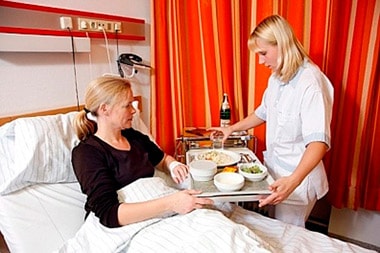Diet after gastric bypass surgery
After surgery, the patient must be extremely careful about what he eats to avoid ulcers at the anastomosis and to allow the stomach (now only part left) to fully digest the food.
People who have had a gastrectomy are only allowed to eat select foods and eat them in small amounts.

Here are some dietary things that patients after gastric surgery need to remember:
- After being discharged from the hospital, you should first eat liquid, light meals, divide your meals into many small meals and then gradually increase the amount of food. You can use pre-processed nutritional powders such as Ensine, Isocal, Sando source, Enalac... If you drink milk, you should drink a little at a time, using it while "listening" to prevent diarrhea because the body has lost lactose (the enzyme that helps digest milk) since adulthood.
- If you eat porridge (sweet porridge, meat porridge, pureed soup), it should be cooked until soft. If it is lean meat porridge, you should put it in a blender, blend it, then filter it through a sieve to remove the meat's tendons. You can add boiled vegetable water, carrots, and potatoes to simmer together.
- You should eat 6-7 meals/day, each meal 150-200 ml (half a small bowl). Avoid being too hungry or too full. After eating, you need to rest, do not walk or exercise vigorously.
- Avoid eating sour fruits, pickles, pickled onions, spices (vinegar, chili, pepper), stimulants (alcohol, beer, strong tea, coffee) because they can cause ulcers. Avoid eating hard and fibrous foods such as cartilage, bones, and old vegetables.
- You can take vitamin B1, B12 and iron supplements. After gastrectomy, the body may become anemic due to the loss of the pyloric region (which is involved in iron absorption).
According to Vnexpress /VHNTAU - nt






